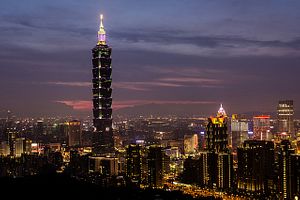India officially recognizes the “one China” policy; constrained by its commitment to Beijing, New Delhi has found it hard to establish its bilateral relationship with Taiwan. However, under Prime Minister Narendra Modi, India has redefined its previous “Look East” policy to an “Act East” policy, which includes more and more focus on the India-Taiwan relationship.
India ceased bilateral relations with Taiwan, formally known as the Republic of China, and recognized the People’s Republic of China in 1950, only a few years after Indian indepedence. During the Cold War period New Delhi and Taipei’s informal relations deteriorate further, as India joined the non-aligned movement and Taiwan joined the U.S.-led bloc.
Despite not maintaining any official diplomatic relations, in the late 1990s bilateral relations between New Delhi and Taipei improved. This change was brought by Prime Minister Narsimha Rao’s government. Subsequently, both parties established unofficial relations in 1995 with the formation of the India-Taipei Association (ITA) in Taipei. Since the ITA was founded, the two sides have signed plenty of bilateral agreements relating to trade and investment, technology, education, and culture.
When Modi assumed office in June 2014, Taiwan welcomed his victory as a vital opportunity to further upgrade the relationship between the two entities. As Jeff Smith pointed out in a previous Diplomat article, Modi is one of the few Indian politicians who has visited Taiwan — in 1999, as general secretary of the BJP — and he also “hosted the largest-ever Taiwanese business delegation in India as the Chief Minister of Gujarat” in 2011.
Now, the Modi government is giving more attention to developing quadrilateral and triangular coalitions with the United States, Australia, and Japan as part of its regional security strategy. The insertion of Taiwan can prove to be essential in this endeavor. Improving Taiwan ties also provides a strategic card for India to play to bargain with China.
Both India and Taiwan have deep and serious concerns over China’s emerging power in the world and particular in the region. India, for example, has unresolved territorial issues with China. New Delhi and Taipei believe that the China factor may become a way to bring their strategic communities closer.
Despite Chinese protests, then, India and Taiwan relations are on the upswing. Their recent economic relations have particularly thrived. As Smith noted, from 2002-2014, Taiwanese investment in India amounted to a total of just $66 million but Taiwanese FDI in India surged exponentially in 2015 with a $5 billion investment from Taiwan’s Foxconn. Smith adds, “Bilateral trade approached $6 billion in 2016, with as many as 90 Taiwanese firms now working and investing in India.”
Still, some Indian security experts believe that Modi has not gone far enough. According to their view, India should include defense relations in the growing economic and political portfolio with Taiwan. Some are recommending that India should send a military attache to Taiwan to improve defense ties.
India has always tried to used China’s “core issues” — like Taiwan, the Dalai Lama, and the South China Sea — as a strategic card against China. Now the China-Pakistan Economic Corridor (CPEC) has crystallized India’s motives. CPEC, a massive infrastructural undertaking, will see Chinese investment into Pakistan-administered Kashmir, which is also claimed by India. That has led to fierce protests from New Delhi.
CPEC is a part of the broader Chinese One Belt One Road (OBOR) initiative, which involves many South Asian countries. In addition to Pakistan, Sri Lanka, Bangladesh, and Nepal are key stakeholders of the OBOR initiative. India has been invited multiple times to join the club and offered CPEC-like projects (such as China-Nepal-India trilateral cooperation) but not steadfastly refused, fearing China’s increased influence. In this regard, Indian policymakers believe that Taiwan, a very sensitive topic for China, can be used as a tit-for-tat to counter CPEC.
Chinese is a major trading partner for India, although historical feuds and political discord make economic cooperation between the two neighboring states more difficult. The Modi government clearly has misgivings about CPEC, but challenging China with the Taiwan question and using it as a strategic card may create instability in the region, which will ultimately harm both Asian giants.
Dr. Imran Ali Sandano holds a PhD in Nontraditional Security Management, an MPhil in Peace and Conflict Studies, and a Masters in International Relations. Currently, Dr. Sandano is working as a visiting research fellow at the Center for Nontraditional Security and Peaceful Development, Zhejiang University, Hangzhou, China.

































